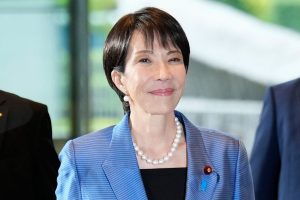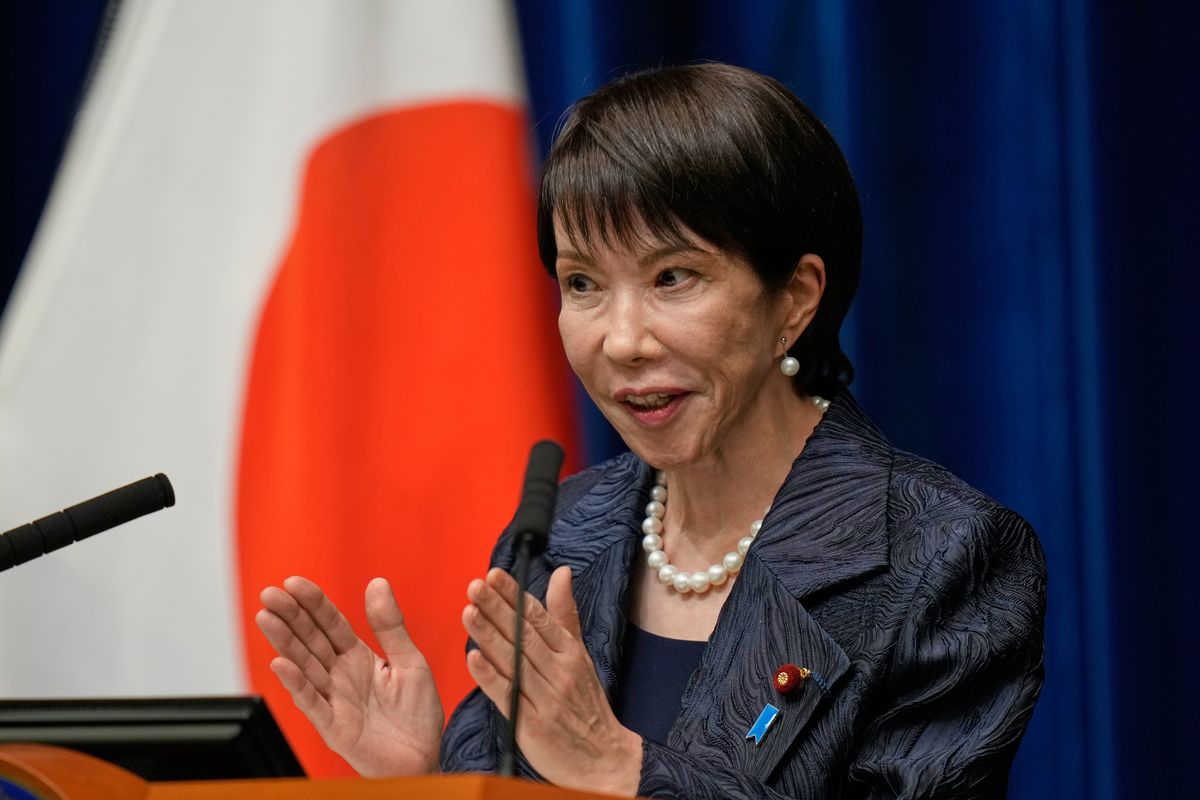TOKYO (AP) — Japan’s parliament on Tuesday elected ultraconservative Sanae Takaichi as the country’s first female prime minister, and she underlined her commitment to boosting Japanese defense as she prepared to host visiting U.S. President Donald Trump next week.
Takaichi replaces outgoing Shigeru Ishiba after the long-ruling Liberal Democratic Party suffered disastrous losses in July elections for parliament’s upper house and lost its majority in the lower house last year. Her election comes a day after the LDP struck a deal in a fragile coalition with a new partner expected to pull her governing bloc further to the right.
“I’m determined to build a strong Japanese economy and protect Japan’s national interest with diplomacy and security,” said Takaichi, a security hawk who was elected head of the LDP on Oct. 4 after Ishiba resigned to take responsibility for the latest election defeat.
Takaichi cited the Japan-U.S. alliance as a “cornerstone” of Japanese diplomacy and stressed that Japan is an indispensable partner for America in its strategy to provide counterweights to China in the Indo-Pacific region. Trump is scheduled to visit Japan next Monday to Wednesday.
A first, but not a feminist
While Takaichi made history by becoming the first female leader of a country where men still largely hold sway, she has not promoted gender equality or diversity.
An admirer of former British Prime Minister Margaret Thatcher, Takaichi is among the Japanese politicians who have stonewalled measures for women’s advancement. She supports the imperial family’s male-only succession, and opposes allowing separate surnames for married couples.
And despite a pledge to drastically increase the number of women in the Cabinet, she appointed only two woman ministers — Satsuki Katayama as finance minister and Kimi Onoda as economic security minister.
Takaichi also opposes same-sex marriage.
“The birth of Japan’s first female prime minister is epoch-making, but she casts a dark cloud over gender equality and sexual minority rights,” LGBTQ+ rights activist Soshi Matsuoka said, adding that Takaichi’s “extremely conservative” views could be a “serious setback” for the rights of sexual minorities.
However, some Japanese feel that her breaking the glass ceiling in politics is an important marker of progress in itself.
Takayuki Eguchi, a 62-year-old Tokyo resident, said he had doubted that a woman would even be able to get enough votes in parliament. He celebrated Takaichi’s achievement by collecting a free special newspaper edition distributed on Tuesday.
“I really hope she serves for a long time, and that the political stagnation we’ve been seeing finally starts to move, and that things improve in Japan and in the eyes of the world,” Eguchi said.
A fragile governing alliance
The LDP’s alliance with the Osaka-based right-wing Japan Innovation Party, or Ishin no Kai, is short of a majority in both houses, but Takaichi was still able to win the premiership because the opposition is not united.
Her alliance’s lack of a majority will mean that it will need to court opposition groups to pass any legislation — a risk that could make her government unstable and short-lived.
Takaichi on Tuesday stressed the need to cooperate. “Without political stability, we cannot achieve strong economic policies, diplomacy, security or anything,” she said.
Her coalition’s two parties signed agreement on policies underscoring Takaichi’s hawkish and nationalistic views. Their last-minute deal came after the Liberal Democrats lost the party’s longtime partner, the Buddhist-backed Komeito, which has a more dovish and centrist stance. The breakup threatened a change of power for the LDP, which has governed Japan almost uninterrupted for decades.
Her challenges
Takaichi is preparing for a major policy speech later this week, talks with Trump and regional summits during which she also needs to ensure stable ties with China and South Korea. She needs to quickly tackle rising prices and compile economy-boosting measures by late December to address public frustration.
A protege of assassinated former Prime Minister Shinzo Abe, Takaichi is expected to emulate his policies, including a stronger military and economy. With her potentially weak grip on power, it’s not clear how much Takaichi will be able to achieve.
Developing friendly ties with Trump might be a challenge, but her close ties and admiration of Abe, who apparently had won Trump’s trust, may help her.
“At first, I hope to develop relations of trust between the two leaders through candid exchange of views about the challenges that Japan and the United States face,” Takaichi said.
Takaichi was first elected to parliament in 1993 and has served in senior posts including as minister of economic security and internal affairs, but her diplomatic background is thin.
Concerns about her nationalism
When Komeito left the governing coalition, it raised concern about Takaichi’s view of Japan’s wartime past. She has taken part in regular prayers at the Yasukuni Shrine despite protests from Beijing and Seoul, which see the visits as a sign of lack of remorse for Japanese aggression. Some of Takaichi’s remarks have also been denounced as xenophobic.
Takaichi, who is pro-Taiwan, has toned down her hawkish rhetoric. On Friday, she sent a religious ornament to Yasukuni instead of going there herself.
On Tuesday, she said she wants stable ties with Seoul and hopes to meet with South Korean President Lee Jae Myung. “There may be worries, but I love Korean seaweed, I use Korean cosmetics, and I watch Korean dramas too.”
China, South Korea and EU react
South Korea’s president congratulated Takaichi and said he hopes to hold a summit with her during the Asia-Pacific Economic Cooperation meetings in South Korea this month. He said South Korea-Japan relations are more important than ever as global uncertainty deepens.
A Chinese Foreign Ministry spokesperson, Guo Jiakun, said that he hoped Japan would “honor its political commitments on major issues including on history and Taiwan, maintain the political foundation of bilateral relations and advance the China-Japan strategic relations of mutual benefit.” China considers Taiwan, a former Japanese colony, its own breakaway province to be annexed by force if necessary.
European Commission President Ursula von der Leyen congratulated Takaichi and pledged to work with her on behalf of the 27-nation European Union.
“As Japan’s first female PM, you’re making history,” von der Leyen wrote. “I look forward to working closely together to take the unique-EU Japan partnership to the next level.”
___
AP journalists Mayuko Ono and Reeno Hashimoto in Tokyo, Kim Tong-hyung in Seoul, South Korea, Simina Mistreanu in Taipei, Taiwan and Sam McNeil in Brussels contributed to this report.
By MARI YAMAGUCHI
Associated Press


